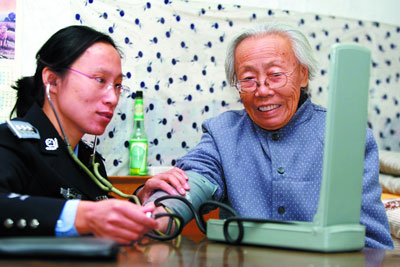City prepares for aging population
Updated: 2008-01-26 09:20
Apart from its soaring economy, Beijing is experiencing another kind of growth - in the age of its population.
 A police nurse takes an elderly woman's blood pressure as part of a medical checkup at her home in the Xicheng district of Beijing in November. A growing number of police officers have become involved with providing healthcare services to senior citizens in the community. [China Daily] |
According to figures released on Friday by the municipal civil affairs bureau, the city has 2.36 million people aged 60 or above, equivalent to about 15 percent of the total.
Bureau spokesman Guo Xusheng said although the figure had risen by 340,000 from last year, the rate of growth could accelerate in the future, putting pressure on the city's social security system.
A report by Beijing's working committee for the aged released late last year forecast the city's gray-haired population would reach 6.5 million by 2050, meaning one out of every three residents would be over 60.
Guo told a government press conference the reason why there are now more elderly people is simply because people are living longer. At the end of last year, the average life expectancy for a Beijinger was 80.2 years, up 2.3 years on 2002.
Yang Hui, a researcher with Beijing's Renmin University of China, warned that an aging society puts "great pressure" on the city's medical resources and a "burden" on the workforce.
"If the city draws too much fresh blood from the outside, it will face anther big problem - a booming population," he said.
According to figures released on Thursday by the Beijing statistics bureau, at the end of last year, Beijing's population was 16.33 million, up 520,000 on 2006, the biggest annual increase in six years.
Guo said the government had taken steps to prepare the city for its rapidly aging population.
Last year, the authorities allocated 11.7 million yuan ($1.6 million) to build and renovate homes for the elderly. The city now has 336 such properties able to accommodate 38,080 people, Guo said.
"We want to increase the number of beds to 50,000 by 2010," he said, adding that community services and medical care for the elderly will also be improved.
Also at Friday's press conference, Guo said the municipal government will continue to provide low-income families with subsidies to help counter the rising cost of living.
In October, the authorities began paying monthly subsidies of 20 yuan to 229,000 of the city's lowest earners.
Under the initial plan, the subsidies were to end in February, but Guo said the government had decided to extend them until June to account for possible further price hikes.
|
|
|
||
|
||
|
|
|
|